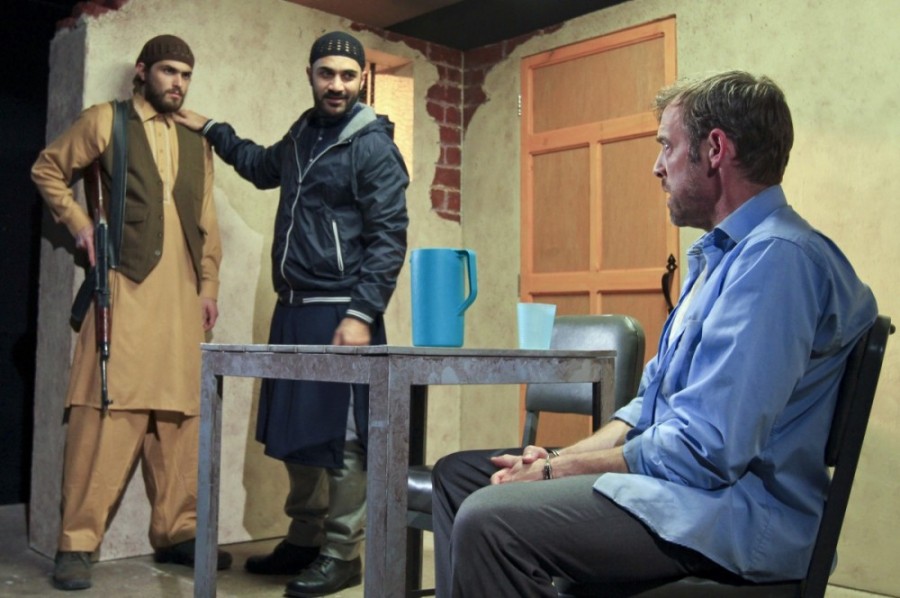
The Invisible Hand, by Ayad Akhtar. Matthew Pfeiffer directed. Theatre Exile, Philadelphia.
If you were to judge by comments on the web and by advertising, you’d think that Ayad Akhtar’s play, The Invisible Hand, is primarily about an American escaping from Jihandist terrorists. But that’s not the real focus of this drama.
Contrary to your expectations, it turns out to be less like the movie Zero Dark Thirty (with “enhanced interrogation” and a rescue mission) and more like The Big Short — in other words, less about Jihadist terrorism and more about stock-market manipulation.
It’s notable that, after this play, Akhtar wrote Junk: The Golden Age of Debt which is about corporate avarice in the eighties and is scheduled for a world premiere at La Jolla Playhouse in the summer of 2016. This Columbia University-educated playwright clearly has a strong interest in economics.
Akhtar has combined a political thriller with the craft of stock market gambling. The prison cell becomes, in effect, a trading desk where the players are shorting and skimming. Along the way, the Pakistani-American playwright explores the distinctions among various Muslims, their disparate motivations and their relationships with militant groups in the Middle East.
At the end, the menace that we feel is more about our family’s economic future than about whether this captive will live or die. The kidnapper Bashir sums up the focus when he gets obsessed with puts and calls and wails “So what the fuck is a future?”
Akhtar is best known for his earlier play Disgraced which received the 2013 Pulitzer Prize for Drama but which has many contrived plot devices. The Invisible Hand, written in 2015, is a better drama. For my critique of the earlier play, click here..
The New York Times reviewer complained about The Invisible Hand, “The suspense surrounding Nick’s fate feels like a mere pretext for a lesson in the workings of the markets.” You think? Damn right. And it’s a better play because of this.
The title, by the way, comes from Adam Smith’s treatise on capitalism, The Wealth of Nations. The phrase refers to an unseen mechanism that maintains equal equilibrium between supply and demand in the market.
Akhtar makes other pertinent references to traditions of international economics. One such is the Bretton Woods Conference at the end of World War II which was hailed at the time as the dawn of a new era of world-wide cooperation. The idealistic view of Bretton Woods was that “Countries that can’t trade with one another go to war against each other.”
The Invisible Hand argues that acquisition of money is a more important force than any religious or political cause, no matter what the zealots say.
As the play begins, Nick (Ian Merrill Peakes), a high-level American employee of Citibank in Pakistan, is being held by militants. They demand $10 million in ransom, but neither Citibank nor the U.S. government will negotiate. So Nick tells his captors that he could use his banking skills to make his ransom by speculating on stocks and currencies. They bring a laptop into his cell and start to manipulate the markets. They make millions in a few months, and then the relationships between Muslim factions shift dramatically.
Akhtar has drawn his characters with nuance. One captor claims that his only purpose in agreeing to hold Nick for ransom is to raise money for people’s welfare. Another, who was born and raised in England, compares himself to idealists who had fought in the Spanish Civil War: “All these young men from different countries running off to give their lives to fight the dictator, Franco. That’s what I’m doing. That’s what a whole generation of us is doing. Giving up soft lives in the West to fight for something meaningful.”
The point is made that not all Arabs, or Muslims, or even all members of terrorist organizations, are the same as each other. Most importantly, Akhtar does this without preaching. And unlike Disgraced, without straining credulity.
Peakes’s performance is gripping, and so are those by each of the three militants, played by Anthony Mustafa Adair, Maboud Ebrahimzadeh and and J. Paul Nicholas. Matthew Pfeiffer directed with a great sense of momentum.
Please share your thoughts with us. Address to editor@theculturalcritic.com
Read other reviews on The Cultural Critic